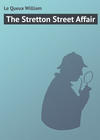Loe raamatut: «The Temptress», lehekülg 15
Chapter Twenty Eight
At La Nouvelle
A wide, vast expanse of glassy sapphire sea.
The giant mountains rose in the west, sheer and steep – purple barriers between the land and the setting sun. A golden fire edging their white crests, that grew from their own dense, sombre shadows to the crimson light which flooded their heads, solemn and silent. And the calm Pacific Ocean lay unruffled in the brilliant blood-red afterglow.
Seated upon a great lichen-covered boulder on the outskirts of a dense forest, a solitary man gazed blankly and with unutterable sadness upon the magnificent scene. Above him the trees were hung with a drapery of vines and tropical creepers bearing red and purple flowers, and forming natural arches and bowers more beautiful than ever fashioned by man. Parrots and other birds of bright plumage were flying about among the trees – among them guacamayas, or great macaws, large, clothed in red, yellow, and green, and when on the wing displaying a splendid plumage. But there were also vultures and scorpions, and, running across the road to the beach and up the trees, innumerable iguanas. Great cocoanut and plantain trees jutted out and massed themselves to the right and to the left. A mountain torrent, sweeping swiftly over a moss-grown rocky ledge, seethed for a few moments in white foam, and then gurgled away down the bright shingles into the sea.
The man sat there stonily, voiceless, motionless, his chin fallen upon his chest, his hands clasped in front of him. Dressed in grey shirt and trousers that were ragged and covered with dust and dried clay, his appearance was scarcely prepossessing. On the back of his shirt was painted in large black numerals “3098,” and his ankles were fettered by two oblong iron links. He was a convict.
Under the broad-brimmed, battered straw hat that protected his head from the tropical glare was a ruddy, auburn-bearded face, with sad blue eyes which at times turned anxiously up and down the beach path – the sun-tanned face of Hugh Trethowen.
His pickaxe lay on the ground before him, for he was resting after his long day’s toil in the mine.
Toil! He shuddered when he thought of the weary monotony of his life. Down in the dark, dismal working he was compelled to hew and delve for twelve hours each day, and to satisfactorily perform the task set him by his warder before he was allowed his ration of food. Half an hour’s relaxation when leaving the mine was all that the discipline allowed, after which the convicts were compelled to return to the prison to their evening meal, and afterwards to work at various trades for two hours longer before they were sent to their cells. The French Republic shows no leniency towards prisoners condemned to travaux forces, and transported to the penal settlement in New Caledonia, consequently the latter live under a régime that is terribly harsh and oft-times absolutely inhuman.
Instead of chattering with the forcats, assassins, robbers, and scoundrels of all denominations and varieties of crime who were his fellow-prisoners, Hugh, in the brief half-hour’s respite, usually came daily to the same spot, to reflect upon his position, and try to devise some means of escape.
His conviction and transportation had been so rapid that only a confused recollection of it existed in his memory. He remembered the Assize Court – how the sun insolently, ironically, cast his joyous, sparkling beams into the gloomy, densely packed apartment. The hall, dismal and smoke-begrimed, is anything but imposing at best, but it was filled with the foetid exhalations from the crowd that had long taken up every vacant space. The gendarmes at his side looked at one another and smiled. The evidence was given – what it was he did not thoroughly understand – yet he, an upright man, resolute, honest to the very soul, and good-natured to simplicity, found himself accused of complicity in the murder of a man he had never heard of. Despondent at Valérie’s desertion, he took no steps to defend himself; he was heedless of everything.
Then the verdict was pronounced, and the sentence – fifteen years’ penal servitude!
He heard it, but in his apathetic frame of mind he was unaffected by it. He smiled as he recognised how mean was this noted Criminal Court of the Seine, with its paltry chandelier, the smoky ceiling, and the battered crucifix that hung over the bench on which the judges sat in their scarlet robes. Suddenly he thought of Valérie. Surely she would know through the newspapers that his trial was fixed for that day? Why did she not come forward and assist him in proving his innocence.
He strained his eyes among the sea of faces that were turned towards him with the same inquisitive look. She was not there.
“Prisoner, have you anything to say?” asked the presiding judge, when he delivered sentence.
The question fell upon Hugh’s ears and roused him. The thought that Valérie had made no sign since his arrest, although he had written to her, again recurred to him. The die was cast. What probability, what hope, was there of liberty? For the twentieth time, perhaps, this cruel agony, this doubt as to Valérie’s faithfulness, returned to him. She was absent; she had forsaken him.
“Will you answer me, prisoner? Have you anything to say?” repeated the judge sternly.
“I wish to say nothing, except that I am entirely innocent.”
Then they hurried him back to his cell.
He had a hazy recollection of a brief incarceration in the Toulon convict prison, after which came the long voyage to La Nouvelle, and the settlement into the dull, hopeless existence he was now leading – a life so terrible that more than once he longed for death instead.
Sitting there that evening, he was thinking of his wife, refusing even then to believe that she had willingly held aloof from him. He felt confident that by some unfortunate freak of fate she had been unaware of his arrest, and might still be searching for him in vain. Perhaps the letters he wrote to her to the hotel and to Coombe might never have been posted. If they had not, there was now no chance of sending a message home, for one of the rules observed most strictly in the penal colony is that letters from convicts to their friends are forbidden. The unfortunate ones are completely isolated from the world. The families of French prisoners sent out to the Pacific Islands can obtain news of them at the Bureau of Prisons in Paris, but nowhere else. When convicts are handed over to the governor of the colony, their names are not given; they are known henceforth by numbers only.
Convict number 3098 knew that it was useless to hope any longer, yet it was almost incredible, he told himself, that he, an innocent man and an English subject, should be sent there to a living tomb for an offence that he did not commit – for the murder of a person whose name he had never before heard.
“I wonder where Valérie is now?” he said aloud, giving vent to a long-drawn sigh. “I wonder whether she ever thinks about me? Perhaps she does; perhaps she is wearing her heart out scouring every continental city in a futile endeavour to find me; perhaps – perhaps she’ll think I’m dead, and after a year or two of mourning marry some one else.”
He uttered the words in a low voice, more marked by suffering than by resignation. He preferred the companionship of his own thoughts, sad as they were; his mind always turned to Valérie, to the sad ruin of all his hopes.
“And Jack Egerton,” he continued, resting his chin upon his hands; “he must know, too, that I have disappeared. Will he seek me? Yet, what’s the use of hoping – trusting in the impossible – no one would dream of finding me in a French convict prison. No,” he added bitterly, “I must abandon hope, which at best is but a phantom pursued by eager fools. I must cast aside all thought of returning to civilisation, to home – to Valérie. I’ve seen her – seen her for the last time! No, it can’t be that we shall ever meet – that I shall ever set eyes again upon the woman who is more to me than life itself!”
He paused. In his ears there seemed to ring a little peal of Valérie’s silvery laughter, which mocked the chill, dead despair that had buried itself so deeply in his heart.
The tears sprang to his eyes, but he wiped them away with a brusque movement, and looked about abstractedly. The sun had set behind the crags, and had been succeeded by the soft tropical twilight. A faint breeze was abroad. The sough of the leaves above was lost in the gurgling of the mountain torrent as it rushed over its rocky bed. The palms, played upon by the wind, made a sound of their own. It was silence in the midst of sound, and sound in the midst of silence – majestic, contradictory, although natural.
“And I shall never see her again!” he murmured. “I shall remain here working and living from day to day, a blank, aimless existence until I die. I’ve heard it said that Fate puts her mark on those she intends to strike, and the truth of that I’ve never recognised until now. I remember what a strange apprehensive feeling came over me on the night we left London for Paris – a kind of foreboding that misfortune was upon me, a strange presage of evil. Again, that warning of Dolly’s was curious. I wonder what was contained in that newspaper report that she so particularly desired me to see? I’m sure Dolly loved me. If I had married her, perhaps, after all, I should have been happier. It was inflicting an absolute cruelty upon her when I cast her aside and married Valérie. Yet she bore it silently, without complaint, although I’m confident it almost broke her heart, poor girl!”
Sighing heavily, he passed his grimy, blistered hand wearily across his forehead.
“To think that I’m dead to them; that we shall never again meet! It seems impossible, although it’s the plain, undisguised truth. That canting old priest told me yesterday that God would extend His mercy to those of us who sought it. Bah! I don’t believe it. If the circumstances of our lives were controlled by the Almighty, He would never allow an innocent man like myself to suffer such punishment unjustly. No,” he declared in a wild outburst of despair, “the belief that God is Master of the world is an exploded fallacy. What proof have we of the existence of a Supreme Being? None. What proof of a life hereafter? None. Religion is a mere sentimental pastime for women and fools. For priests to try and convert convicts is a sorry, miserable farce. There is no God!”
Several minutes elapsed, during which he thought seriously upon the mad words that had escaped him. The recollection of the religious teaching he had received at his mother’s knee came back to him. He had often jested at holy things, but never before had he been smitten by conscience as now.
“Suppose – suppose, after all, there is an Almighty Power,” he said thoughtfully, in an awed voice. “Suppose it is enabled to direct circumstances and control destiny. In that case God could give me freedom. He could give Valérie back to me, and I should return home and resume the perfect happiness that was so brief and so suddenly dispelled. Ah! if such things could be! And – why not? My mother – did she not believe in God? Were not the words she uttered with her dying breath a declaration of implicit trust in Him? Did she not die peacefully because of her firm, unshaken faith?”
Jumping to his feet with a sudden resolution, he stretched forth his hands in supplication to heaven, exclaiming, in a hoarse, half-choked whisper —
“I – I believe – yes, I believe there’s a Ruling Power. No! I’ll not abandon all hope yet.”
His arms dropped listlessly to his side again, and he sank upon the boulder where he had been sitting, silent and thoughtful, wondering whether freedom would ever again be his.
“Hulloa,” exclaimed a voice in French. “Why, what’s the matter? Any one watching you from a distance, as I’ve been doing, would think you’d taken leave of your senses.”
Glancing up quickly, he saw it was a bearded, unkempt prisoner who, condemned to a sentence à perpétuité, worked in the mine in the same labour gang as himself.
“I hope you’ve enjoyed the entertainment,” he said, in annoyance.
“Entertainment,” echoed the other. “There is scarcely entertainment in the mauvais quart-d’heure, is there? Bah! we all of us in this malarial death-trap have periods of melancholy, more or less. For myself, I’m never troubled with them. When you’ve been here a few years you’ll see the folly of giving way to gloomy thoughts, and the utter uselessness of entertaining any anticipation of either escape or release.”
“But we may still hope.”
“Hope! What’s the use? What can we hope for – except death?” he asked bitterly. Then, without waiting for a reply, he said, “Let’s forget it all; we shall die some day, and then we shall obtain rest and peace, perhaps.”
“We cannot all forget so easily.”
“There, don’t talk so dismally. Come, we must be going.”
“Where?”
“To the cage,” he replied, indicating the prison by the sobriquet bestowed upon it by the convicts. “The gun has sounded. Did you not hear it? Come, we must hasten, or you know the penalty.”
Hugh sighed again, rose to his feet, took up his pickaxe, and, placing it upon his shoulder, walked with heavy wearied steps beside his companion in misfortune. Both trudged on in dogged silence, broken only by the clanking of their leg-irons, for nearly a quarter of a mile along the rough beach path, until they came to a broader path leading inland, with dense forests on either side.
Here they were met by two armed warders, who roundly abused them for their tardy appearance, and who escorted them within the grim portals of the long, low stone building which stood upon the side of the bare, rugged mountain overlooking Noumea.
Chapter Twenty Nine
Gilded Sorrow
“Good heavens! Why, it can’t be true.”
The exclamation escaped Jack Egerton’s lips as he sat in his studio enjoying his matutinal pipe, and glancing through the Daily News prior to commencing work.
The paragraph he had read contained nothing startling to the ordinary newspaper reader. It was merely an announcement that the will had been proved of the late Mr Hugh Trethowen, of Coombe Hall, Cornwall, who died suddenly at the Hôtel du Nord, Antwerp, and that the whole of the estate, valued at 112,000 pounds, had been left to his wife Valérie.
“Dead! Dead! And I knew nothing of it, poor fellow!” he cried, starting up, and, after re-reading the words, standing motionless. “Died suddenly,” he reflected bitterly. “An ominous expression where Valérie Dedieu is concerned. More than one person who has enjoyed her acquaintance has died suddenly. If I thought he had met with foul play, and could prove it, by Heaven! I’d do so – even at the risk of my own liberty. Poor Hugh,” he added in a low, broken voice. “We have been almost brothers. God! shall I ever forgive myself for not warning him of his danger? Yet I did tell him she was not fit to be his wife, but he took no heed. No; he was infatuated by her fatally seductive smiles and accursed beauty.”
Pushing the hair from his forehead he flung the paper from him with a gesture of despair.
“Dead,” he murmured. “How much I owe to him. In the days when I scarcely earned enough to keep body and soul together, we shared one another’s luck, Bohemians that we were, often living from hand to mouth, and not knowing whence the next half-crown was to come. Always my warmest friend from that time until his marriage: he was an irrepressible, genial, good fellow, whom everybody held in high esteem. Always merry, always light-hearted; in many a dark hour, when I’ve been on the verge of despair, it has been his perfect indifference to melancholy that has cheered and given me heart; nay, it was by his advice and encouragement that, instead of going out to the Transvaal as I intended, I remained here to work and win fame.”
He sighed deeply, and tears welled in his eyes.
“I have no brother; he was one – and – and I’ve lost him. I should have liked to have been at the funeral to have paid a last tribute to his memory. Had I placed a wreath upon the grave, it would have been with hands more tender than any of those persons who showed outward bereavement. Where was the widow, I wonder?”
As he paused, his face grew stern and he clenched his hands.
“Bah! The widow who, by his death, has gained one hundred and twelve thousand pounds – the woman who, staking life for gold, held him in her fatal toils until death severed the bond. I wonder – I wonder, if I went to Antwerp, whether I could discover evidence of foul play? Is it not my duty to try? If he has met the same terrible fate as – ”
“Good-morning, Jack!” exclaimed Dolly Vivian brightly, tripping into the room.
“Good-morning,” he assented sullenly, without looking up at her.
“How disagreeable you are to-day,” she observed, as she commenced unbuttoning her glove. “Anything wrong?”
“Yes, a good deal. I shan’t want you; I can’t work to-day,” he replied sadly.
“What’s the matter?” she asked in alarm, advancing towards him and placing her hand upon his arm.
Turning with a sigh, he looked into her face and said, in a low, earnest tone —
“Dolly, I’ve received bad news.”
“What is it – tell me? Don’t keep me in suspense.”
“It is about some one you know.”
“News of Hugh?” she cried, her thoughts at once reverting to the man she loved.
He nodded, but did not reply.
“What of him? Where is he?”
“Dolly,” he said hesitatingly, – “he is dead.”
“Dead!” she gasped, clutching at a chair for support.
She would have fallen had he not rushed to her and placed his arm around her waist. In a few moments, however, she recovered herself.
“You – you tell me he is dead. How do you know?”
“By the newspaper.”
“Dead! Hugh dead! I can’t – no, I won’t believe it,” she cried wildly. “There must be some mistake.”
“He died suddenly at Antwerp,” Jack said mechanically.
“You mean he has been killed – that his wife is a murderess.”
“Hush, Dolly,” he exclaimed quickly; “you cannot prove that, remember.”
“Oh, can’t I? If he has been murdered, I will discover the truth. Her past is better known to me than she imagines. I’ll denounce Valérie Duvauchel as the woman who – ”
“Why, how did you know that was her name?” he asked in amazement and undisguised alarm.
“What was I saying? Forgive me if I made any unjust remark, but I could not help it,” she urged. “It is all so sudden – and – and he is dead.”
She knew she had said too much, and tried to hide her confusion in the intense grief which his announcement had caused.
“You said her name was Duvauchel?” he said quietly.
“Did I? Well, what of that?”
“You are acquainted with incidents of her past. What is it you know? Tell me.”
She hesitated. Her face was white and agitated, but she had shed no tears. Her heart was stricken with grief, yet she strove to conceal her intense love for the man who was reported dead.
“Why,” she answered slowly, “I know that she – but – indeed, I know nothing,” she added hysterically.
“That’s not the truth,” he said reproachfully.
“Perhaps not. Nevertheless, what I know I shall keep secret. The time may come when I shall have my revenge upon the woman who has robbed me of the man I love – the vile, heartless woman who has killed him.”
“You cannot prove that he met with his death by foul means,” he said reflectively. “The report says he died suddenly – nothing more. Read for yourself,” and he handed her the paper, at the same time pointing to the paragraph.
“Then she has obtained all his money?” Dolly observed mechanically, after she had glanced at it. “Is not that sufficient motive for his death?”
The artist admitted that it was. The unutterable sadness of ten minutes before had given place to a strange apprehensive dread. It was clear that Dolly was in possession of some facts connected with the hidden pages of the Frenchwoman’s history. In that case, he told himself, it was more than probable she would ultimately discover his own secret – the secret which fettered him to this clever, handsome adventuress, even if she were not acquainted with it already. His heart sank within him as he recognised that alienation and loathing would be the inevitable result Dolly would shrink from his touch as from some unclean thing. She would regard him as a debased criminal.
He tried to fix upon some means by which to ascertain the extent of her information. The thought suggested itself that he should tell her something of Valérie’s history, and lead her on to divulge what she knew. Such a course, however, did not commend itself to him. He was bound to preserve the secret, for full well he knew that Valérie’s threats were never idle – that she would show him no mercy if he divulged.
Thus he was as powerless as before. The maddening thought flashed through his mind that a plain, straightforward statement of facts to Hugh when first he had met her would have obviated his ruin and prevented his death.
To and fro he paced the studio in a frenzy of grief and despair.
The pretty model watched him for a moment, then, sinking upon a couch, and covering her face with her hands, burst into a torrent of tears. Unable to control her bitter sorrow, her pent-up feelings obtained vent in a manner that was heart-rending to the kind, sensitive man who stood before her.
“Dolly, I know what a terrible blow this is to you,” said he sympathetically, removing her hat, and tenderly stroking her hair. “You loved him?”
She did not answer at once, hesitating even then to admit the truth.
“Yes,” she sobbed at last, “I did. You little know what I have endured for his sake.”
“Ah! I can well understand. You loved him dearly, yet he left you for the woman who exercised a fatal fascination upon him. With scarcely a word of farewell, he cast your love aside and offered Valérie marriage. I know the depth of your disappointment and terrible sorrow. Don’t think that because I have never made love to you that I am utterly devoid of affection. I loved – once – and it brought me grief quite as poignant as yours; therefore I can sympathise with you.”
He spoke with sadness, and with a heavy sigh passed his hand with aweary gesture across his care-lined brow.
“It’s so foolish of me,” she murmured apologetically, in a low, broken voice. “I ought not to have made this confession.”
“Why not? I had noticed it long ago. Love always betrays itself.”
Lifting her sad, tear-stained face, she looked earnestly into his eyes.
“What can you think of me, Jack?” she asked.
“Think of you?” he repeated. “Why, the same as I have always done – that you are an upright, honest woman. Neither blame nor dishonour attaches to you. When he left you so cruelly, you bore your sorrow bravely, thinking, no doubt, that some day he might return and make you happy. Was not that so?”
She nodded an affirmative. Her gaze was fixed thoughtfully on the canvas which stood on an easel behind him; her slim, white hands were crossed in front of her.
“Since we parted,” she said, in a strained, broken voice, as if speaking to herself, “he has been uppermost in my thoughts. Often when I have been alone, indulging in dreamy musings, I have looked up and seemed to see him standing contemplating me. Then all the regret has fled from my heart, and paradise has stolen in. He has spoken to me, smiled at me, as he did in those pleasant days when first we knew each other. Yet next moment the vision would fade before my eyes, and I have found myself deceived by a mere chimera, tricked by an idle fancy. But now he is dead: gone from me never to return – never.”
And she again gave way to tears, sobbing bitterly.
“Come, come, Dolly,” said the artist, again passing his hand lightly over her hair, endeavouring to soothe her; “don’t be downhearted. Yours is a cruel and heavy sorrow, I know; but try to bear up against it, try to think that perhaps, as you suggested, he is not dead. Even if you have lost your lover, you have in me a true and trusted friend.”
“Yes, I know,” she sobbed brokenly. “You are my only friend. It is extremely kind of you to talk like this; yet you cannot know the extent of my love for him.”
“I quite realise how much you cared for him,” he said slowly, in a pained voice. “If he had married you, his life would have been peaceful and happy. Fate, however, decreed different, and, that being the case, you must try to forget him.”
“Forget him! Never!” she cried. Then recovering herself, she added: “Excuse what I say; I hardly know what I’ve been telling you.”
“Whatever has passed between us will always be kept secret,” he assured her.
“Ah! I feel sure you will tell no one; you are always loyal to a woman.”
“Now, promise to think less about him,” he urged, looking down into her grief-stricken face.
“I cannot,” she replied firmly. “Somehow, I don’t believe that he is dead. I shall endeavour to clear up the mystery and ascertain the truth.”
“And I will render you what assistance I can. Count upon my help,” he said enthusiastically. “We’ll get at the real facts somehow or other.”
“You are very kind,” she answered, drying her tears, and putting on her veil before the mirror. “I have a terrible headache, and am fit for nothing to-day, so I’ll go home.”
To this proposal the artist offered no objection. Her inconsolable grief pained him, and he wanted to be alone to think; so, grasping her hand warmly, he again urged her to bear up under her burden, and watched her walk slowly out, with bowed head and uneven steps.




















